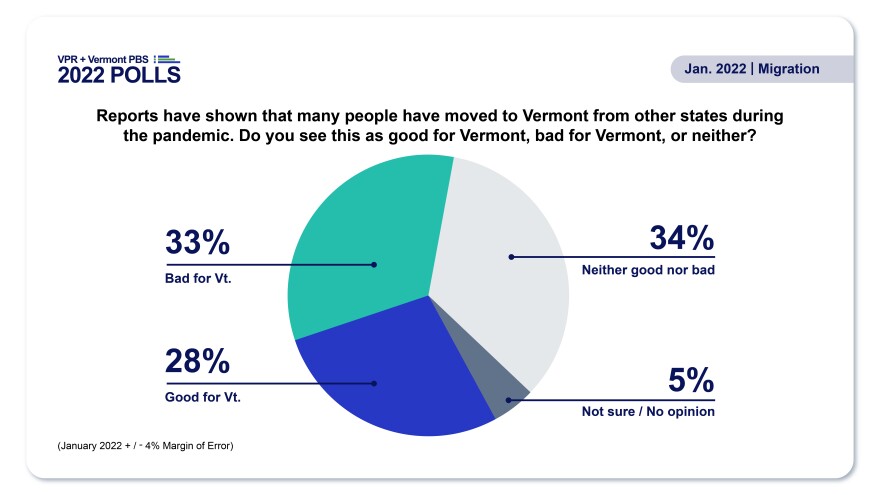By my calculations, there is maximum one degree of separation between people in the Mad River Valley. This means you cannot go into a store without seeing someone you know, or someone who knows you.
I, for one, was spotted by Joanne Verkler. We were at the Village Grocery — better known as the VG — where she was buying lottery tickets. She’s lived in Waitsfield for more than four decades.
In the past couple years, she’s noticed an influx of new people. Which, on one hand, she thinks is a good thing.
"Because Vermont is an aging state, we need new people," Verkler said.
On the other hand, the real estate market is tight.
"We have a senior housing crisis. Young people can't find housing. People that come to work at the mountain can't find housing. And it's a— it's a sad state," she said.
Verkler says she knows one couple from New Jersey who were trying to buy a house in Waitsfield, and one of the places they looked at was priced at $850,000. She says it sold in three days, for cash.
More from VPR: The New 'Beckoning Country'? City Buyers Eye Vermont Property As COVID Sanctuary
Charlie Snow sees this firsthand. He’s had a construction company in Warren for the past 45 years.
"I mean, a lot of them are my business, okay. But there's too many of them here. And they're escaping. Because they don't— you know, there's too many of them where they are," he said. "Most of them got second homes. Most of them ain't. Most of them are buying and paying outrageous prices."
Snow was at the VG on his lunch break. Not only has he had a construction company for 45 years, but he’s lived in the Valley for 70 — his entire life. And he doesn’t like the idea of outsiders changing the community.
"They live here for four or five years and all of a sudden they want to turn it back into New Jersey or New York or Massachusetts," Snow said. "Because all of a sudden now living in the country ain’t good enough for 'em."
That hasn’t happened just yet. For now, Snow’s making money on all the building projects.
The economic benefit is just one of the upsides. Some people, like Karen Jumisko-Amidon, of Randolph, happen to really like their new neighbors.
"We had people from Boston move just around the corner from us," she said. "And what that looks like in real life is not what I would have thought. They're amazing. We love them. We're so excited to have them be part of our community."
The results of the latest VPR-Vermont PBS poll were just as mixed as these reactions: 28% of respondents said new residents are good for Vermont, 33% said they are bad for Vermont, and 34% said they are neither good nor bad. The poll has a 4% margin of error — so this is a nearly even split.
Full Part 2 January 2022 VPR-Vermont PBS Poll Results

According to Middlebury College professor Peter Nelson: "It's not easy to uniformly categorize it as beneficial or problematic."
Nelson has been studying migration to rural areas for the past 25 years.
His research has confirmed that yes, people did move to Vermont during COVID. Lately, he’s been looking at cell phone data to determine where in the state people have moved. He says new residents have flocked to what are known as micropolitan areas — places like Bennington, Rutland and White River Junction. And he says ski towns in the southern part of the state, like Stratton and Mount Snow, also saw a sustained increase in people.
Nelson says the new residents who came to Vermont during the pandemic might be an unexpected solution to some of the state’s long-term problems: the struggle to attract new residents, the aging population, the declining workforce.
"In Addison County, where I live, we're seeing shrinking school enrollment, and there's towns that are just fighting really valiantly to try to retain their primary school," he said. "And without growth and newcomers coming, you're not going to be able to retain your primary school. It doesn't take a rocket scientist to recognize that."
Nelson also says the reasons people are attracted to move to a place like Vermont are probably pretty similar to the reasons why people live here already. The mountains, the local farms, the sense of community.
More from VPR: So much depends upon a small post office, in a store on Route 12, beside Lake Elmore
"What might be wise for us all to recognize is there's probably a lot more similarities between these people that we often paint as being quite different," he said.
On the porch of the VG in Waitsfield, sitting on a bench made of old snowboards and watching cars go by on Route 100, Joanne Verkler says one thing she’s not worried about is her community changing.
"I mean, this place [the VG], you know, this has been the same for 20 years," she said.
And she says that overall, having new people in the state isn’t good or bad — not because it’s neither, but because it’s both.
And regardless, it won't be long before all the new people in the area will also be unable to go to the store without seeing someone they know.
Have questions, comments or tips? Send us a message or get in touch with reporter Anna Van Dine @annasvandine.

From Jan. 3 to Jan. 9, the VPR-Vermont PBS 2022 Poll asked hundreds of Vermonters about their opinions on climate change, broadband, dairy and more. Explore part two of results here. The first part of the results were released in January.




